#i hate that i take a warped satisfaction knowing that i'm also going this path to spite them just a smidge (it didn't start out this way)
Text
Tropes in the Queer Croc WIP
I made this trope map aesthetic a while ago and wanted to share. It made me think about the tropes I included in the Queer Croc WIP.
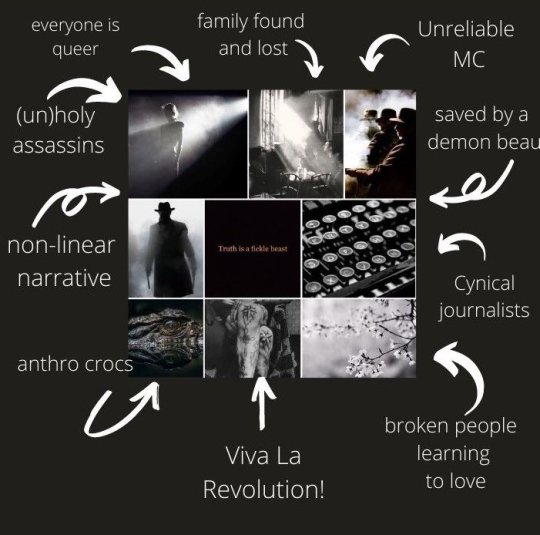
Unreliable Narrator

There is nothing more entertaining and harder than writing an unreliable narrator, but by god do I love it. I enjoy the layers and complexity it can add to a narrative and even though it requires several drafts, by the end you have the satisfaction of knowing all the clues are there for the reader to find if they're looking.
In the QueerCrocWIP, I was able to combine the unreliable narrator with the inherent bias of memoirs and historical memory allowing me to examine that fine line between objective "true" history and the subjective nature of any historical record. Add the fact that Kingsley, one of the MCs, is on trial for war crimes and boy does the truth get warped.
I utilize footnotes to point out where the narrator is wrong, but even the footnotes should be taken with a grain of salt since the person adding the footnotes (Alex, the other MC) has their own agenda they're trying to push. Alex may be more trustworthy than Kingsley, but that doesn't mean they're truthful.
Apparently, there are four unreliable narrator archetypes (I think they're missing a few but this article does a good job summarizing what an unreliable narrator is and how each archetype works).
Kingsley is the Liar archetype. The unreliable narrator who purposely misleads while Alex is the grieving unreliable narrator. They mislead because they cannot see the truth beyond their loss.
Some of my favorite examples of unreliable narrators are:
Non-linear timeline
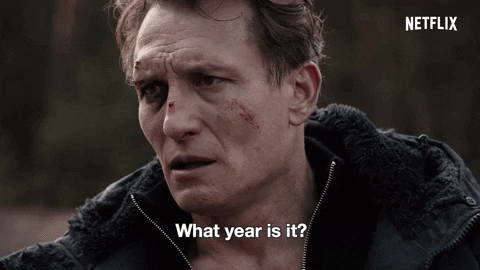
I am a sucker for any story that is told in a non-linear fashion. I particularly love it when the timelines touch each other, either literally like in timeline movies, or metaphorically. It's interesting to think that the past shapes our present which shapes our future but in a weird way the future shapes the past, because the future shapes our understanding of the past. What we believe now shapes how we look at Victorian England for example and what we believe 100 years from now will change how we look at the present (as well as Victorian England). But, in real life we can't step back and look at the past, present, and future simultaneously to see the whole picture. Literature, however, gives us that ability.
That's what I do in the Queer Croc Book. The memoir itself is both the past and the present (present because it's the main storyline, but past because of the future narrative) and the interviews take place in the present/future (present because it's Alex's main storyline, but future because it's the future Kingsley's memoir creates).
The footnotes Alex adds to Kingsley's memoir are literally the future commenting on the past, which warps Alex's perspective because they have the "benefit" of hindsight but also the emotional baggage that comes from living through the future created by Kingsley's memoir. Whereas Kingsley writing the memoir is also the future commenting on the past since he's writing it after going through the future he created. He's more aware of his power over the past whereas Alex acts as if they're "clarifying" the past, not adding their own interpretation.
Whew. Got all of that? Haha. Basically, it's time travel without time travel.
Some of my favorite non-linear stories are:
Found and Lost Family
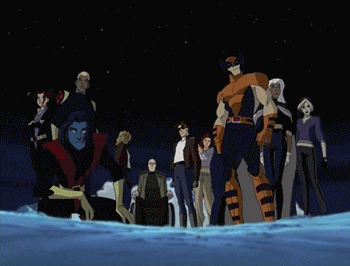
I'm a love X-men because, at its core, it's a story of found family. I love the idea of people who the world hates-and sometimes wants to kill-finding companionship with each other. However, because I also love messy, angsty relationships, I also love when that fellowship is broken because of a betrayal or a misunderstanding or a hard choice was made and the characters either grow or go down a darker path. While I enjoy a good family reunion, it can grow a little stale because of the inevitability of the reunion. When it's not handled well, it doesn't heighten the stakes, but dulls them.
In the Queer Croc WIP, the crafting of a found family and the breaking of it is a reflection of what rebellion and great loss can do to people, but also examines the foundation of a found family. If you only find each other because you want to fight against something, what happens when that something changes for people? Or when people get tired of the fight and want to move on? Or the various ways people deal with grief and how that can exasperate existing but mostly tolerated tensions? Or what if people simply change and grow and that family that saved your life as a teen is no longer the family you need as an adult?
I haven't really found a good example of found families shattering without the healing/forgiveness phase in media but some of my favorite found families are:
Expansive world and politics
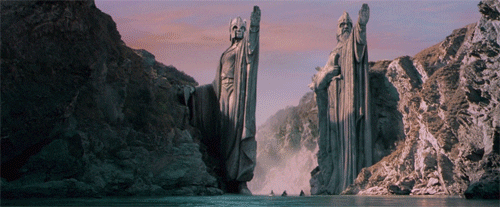
I'm a fantasy writer which means my world is vast and filled with many different beings and my politics is overly complicated and often world ending. And I love it. I love the ridiculously large worlds with centuries worth of history that worms its way into the main text. I love how Tolkien set up his world in terms of lore and world building. I love creating different religions and myths. I love thinking about how different beings will interact with the world. I have at least ten different animal-human hybrid races and they all have different needs than their human counterparts. It's just so much fun spending hours at a time trying to imagine what a world with gargoyles or crocodile people looks like.
I'm also have a masters in international relations, so I'm all about the politics. I think I lean more towards the Godfather side of politics than Tolkien in the sense that politics is a core tenet of any of my stories and that it's a brutal and unforgiving art. It attracts the ruthless and the sycophants and the absolute assholes and politics is often practiced in a way designed to hurt the populace instead of help, but don't worry the rich will keep getting richer and the law breakers will always be protected from any government sanctioned consequences. Sort of why my characters often determine we need a revolution, which comes with its own pitfalls. I also support the Peaky Blinder's thesis that a politician is simply a legitimate gangster.
Some of my favorite examples of expansive worldbuilding are:
Some of my favorite examples of politics are:
Wild Child adopted by grumpy person
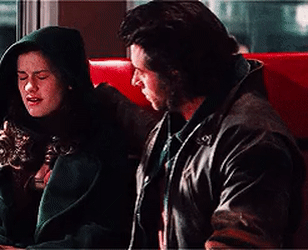
There's not really much more to add here. I LOVE it when a wild child adopts a grumpy person as their parent. I honestly really love wholesome child-parent dynamics when it's a dynamic of choice. I hate the idea that blood equals family, because it's a toxic mindset that can harm more than it helps. But if someone makes the effort to actually be there for you and to love you, warts and all, and can grieve with you and help you process your own trauma, it's absolute perfection
Favorite examples:
Gender Non-conforming fatale
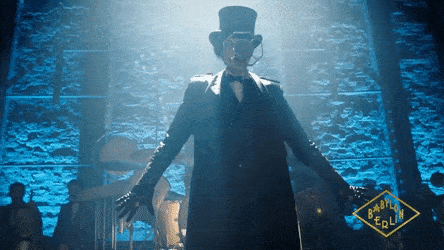
Like any sane person, I love a good femme fatale. A "dangerous" woman who will do whatever and whoever she has to get what she wants. I especially love her when she's not "redeemed" by love or the hero or whatever. When she remains as ruthless as she started.
As a non-binary person, I love the trope even more when it's a trans person or gender nonconforming person who's the fatale. I haven't seen this very often in media and even the Babylon Berlin gif I've included in this section doesn't count. Svetlana presents as male to achieve certain objectives, but there's no indication that she truly identifies as male or nonbinary or bigender. But I still love her and would probably die for her, haha
In the Queer Croc WIPk, my gender non-conforming fatale is Oisin O'Connor a sex worker, nightclub owner, and one of the most powerful politicians in Heva.

Artwork by @braveburattino
Oisin is as comfortable in overalls as he is in stiletto's and a backless dress. He identifies as a man, but, like most Ilkhatal, challenges all human concepts of what makes something masculine. He just does it in the extreme-in true Oisin fashion. He is one of Kingsley's deadliest allies (except for maybe the Demon king). He's destroyed people's lives, stripped them of everything they owned and valued, shattered all of their hopes and dreams, and even arranged a few murders. He'll do literally anything for Kingsley, except die destitute and unwanted.
Alex's relationship with Oisin is interesting because they only know Oisin through Kingsley's memoir and Oisin's own letters and diary, but they find themselves siding with Oisin more times than not. It's almost like the detective who falls in love with Laura in the movie Laura, except I don't think Alex is in love with Oisin. Definitely charmed by him, but who isn't?
Favorite femme fatales:
Broken Idealist
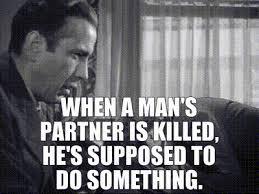
The next biggest noir archetype is the cynical or broken idealist who is usually a private detective or news reporter. They pretend they don't believe in anything, but deep down there is still that code or that silly faith in humanity they've tried to suppress. Whether it be avenging a partner you hated or fighting for the fragment that remains of a city's soul, these broken idealists will fight the entire world if they have to.
Alex isn't completely cynical in this book. It's more like you're watching them break in real time as the few things that got them through the war are no longer enough to keep themselves together. It's almost like they compartmentalized all the doubts to get through the war and now that it's over and Kingsley, the crocodile person who tortured Alex's wife, is on trial, they can no longer hold everything back.
So they latch onto Kingsley's trial in hopes of restoring order in their own mind, but what are they actually accomplishing if Kingsley hangs, but his enablers, not only walk off scot free, but return to politics or business as if nothing happened? And then there's the mess with their wife. Alex has a lot to deal with and they are in no position to deal with any of it.
Favorite examples of broken idealists:
Broken people learning how to love

Sometimes your best efforts aren't enough. Sometimes you can't save the world or undo a wrong. Sometimes all you can do is love another human being as the rest of the world falls apart around you. Sometimes the only way to heal is to let someone else speak with your demons.
I'm a huge sucker for two (or more) people finding each other and trauma bonding. I don't even need them to actual heal. They can indulge in their darkness, as long as they do it together and find some sort of comfort or cathartic release. Hell, they could destroy the world together if it brought them joy. I just want the two broken people to find their own special happiness, even if only for a moment.
There are several characters throughout the wip who find each other when they're at their lowest point, but I think the biggest example of this trope is Alex's relationship with their wife, Christine. Can't get into it too much because of spoilers, but they've been through a lot of shit and both characters are broken a hundred different ways and all they have is each other. No one else can really reach them or help them. However, even if they share their pain and help each other heal, there's no guarantee their relationship will survive the process.
My favorite examples of this trope:
Uncomfortable interrogations and Courtroom Drama
I love courtroom dramas that aren't about the court room. I don't care about the legal technicalities. I love it when a courtroom drama explores the many ways prejudices, bias, politics, and the outside world can affect a trial, skewering a justice system that doesn't really work. I care more about the moral dilemma of trusting a broken system to correctly punish those responsible for a crime, when in reality it's the entire system that's responsible. A single courtroom and a single case can't undo the damage caused by a broken system and when the verdict's announced, it can mean so little because what did it actually accomplish?
I also love it when the protagonist talks with the antagonist, both sides trying to break each other, and so they end up sharing much more than they ever expected and at the end you either walk away realizing that the antagonist is far worse than you imagined or they are only a thread in a tapestry of horror.
Alex's main storyline is interviewing Kingsley, the crocodile person who tortured their wife, while reporting on Kingsley's trial for war crimes. They struggle with balancing their own vendetta against being a reporter and uncovering the full extent of, not only Kingsley's crimes, but the crimes of his enablers. But will any of that matter if Kingsley and his enablers get off scot free? I think this scene from Judgment of Nuremberg explains Alex's situation pretty well. In this clip, Tad is a prosecutor prosecuting Nazi judges. The trials have been going on for a while and all the big name Nazis are now dead and people are beginning to question the purpose of the trial. He just exhibited evidence of the Holocaust in court and is preparing for his closing statements for the next day. In this clip, his boss basically tells him: "Stop being mean to Nazis. We need German support to fight the Soviets" and he replies, "Tell me, what was the war all about?"
youtube
Favorite examples:
These are just some of the tropes you'll find in the Queer Croc WIP. What are some of the tropes in your books? What are some of your favorite tropes?
8 notes
·
View notes